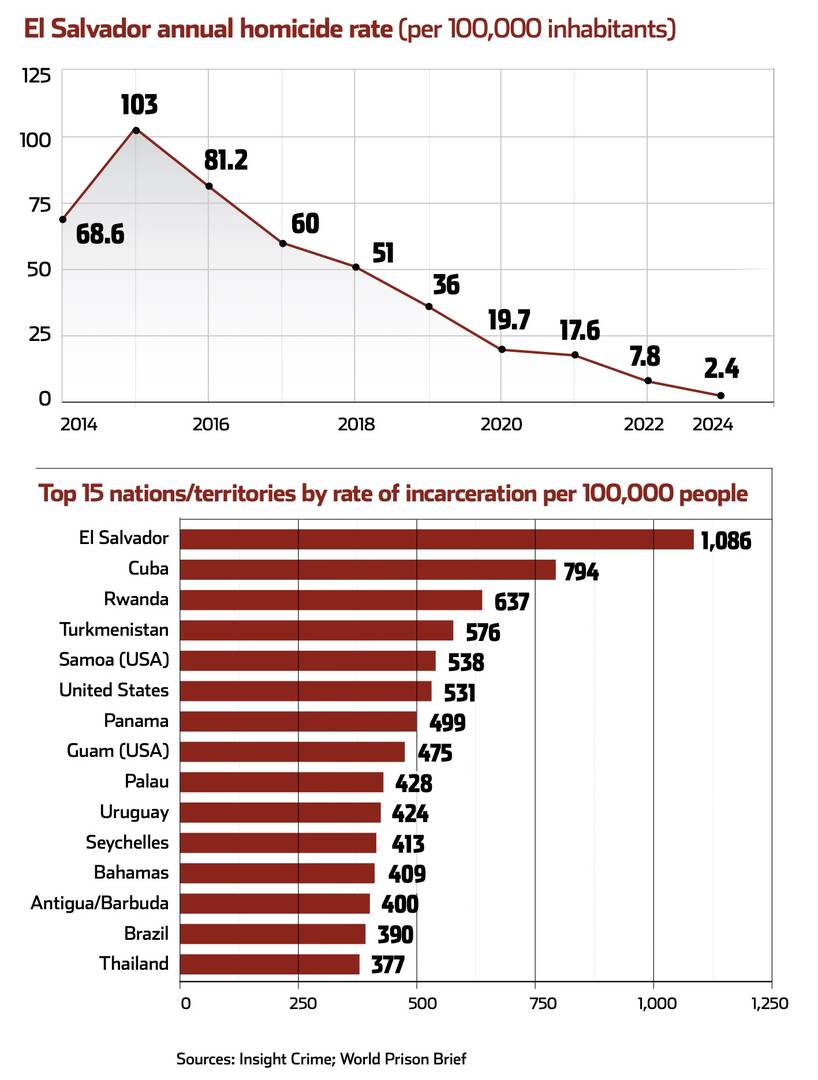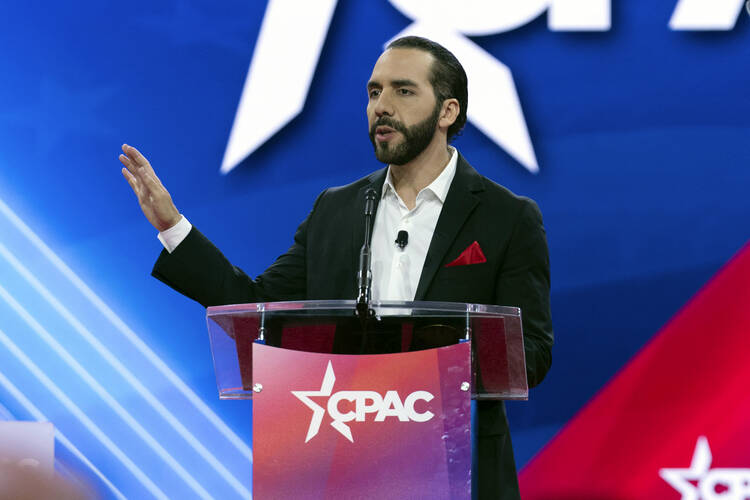The Weekly Dispatch takes a deep dive into breaking events and issues of significance around our world and our nation today, providing the background readers need to make better sense of the headlines speeding past us each week. For more news and analysis from around the world, visit Dispatches.
Some March anniversaries of note arrive next week for the people of El Salvador. March 24 will mark 44 years since the martyrdom of St. Óscar Romero, assassinated by agents of a political elite that had come to see its own people as the enemy. And March 27 begins a third year under a “state of exception” declared in 2022 by President Nayib Bukele. The decree authorized extraordinary means, including the suspension of civil liberties, to suppress gang violence.
Mr. Bukele’s decree received its 24th consecutive one-month extension on March 9, approved with 67 votes in the 84-seat Salvadoran Congress, where Mr. Bukele’s Nuevas Ideas party holds a supermajority after elections in February.
The president has used his emergency powers to detain more than 78,000 suspected gang members in security sweeps that human rights groups charge are often arbitrary and violent. Many arrests have been based on a person’s appearance or the neighborhood they reside in. The government has had to release more than 7,000 people because of a lack of evidence connecting them to any crime.
The original 30-day “state of exception” order, declared in the aftermath of a two-day storm of 87 homicides, empowers security forces to arrest anyone suspected of belonging to a gang or providing support to gangs. It also suspends their right to be informed of the reason for their detention, to legal defense during initial investigations, to privacy in conversations and correspondence, and to freedom of association. The state of exception also extends the time that a suspect can be held without charges in El Salvador to 15 days.
A 2022 State Department assessment noted: “Numerous reports of arbitrary arrests, invasion of homes, unfair judicial procedures, and deaths of detainees followed the declaration. More than 52,000 persons were arrested in the first six months of the state of exception, leading to allegations of overcrowding and inhuman treatment in the prisons.”
And one year into the decree period, the Central American human rights advocacy group Cristosal issued a report documenting 153 deaths of people held in custody under the decree. “None of the people who died had been found guilty of the crime for which they were charged at the time of arrest,” the report’s authors said. Cristosal includes accounts of deaths that have resulted because of torture, negligence, even malnutrition.
Since the emergency declaration, according to the report, “tens of thousands of people have been arrested with no prior investigation and subjected to torture, cruel, inhuman, and degrading treatment in an already collapsing prison system or prisons created to enforce the regime. The end result is that the terror of the gangs has been replaced by the systematic violence of the State.”
The president’s special powers have been deplored repeatedly by civil libertarians and human rights advocates both inside and outside El Salvador. In a normally functioning society, they might be the kind of authoritarian powers that the general public would be reluctant to hand over to government, particularly in a society like El Salvador’s which is all too familiar with the potential agony of a government and security force running amok on its own people. But in crime-exhausted El Salvador, Mr. Bukele’s mano dura (“hard-handed”) approach to the gangs has enjoyed broad public and even ecclesiastical support.
A few months after the decree was issued, Archbishop José Luis Escobar Alas of San Salvador acknowledged that most Salvadorans supported the measure. El Salvador’s gangs, primarily Mara Salvatrucha (MS-13) and Barrio 18, have been estimated to include some 70,000 members in their ranks. The gangs, rooted in the Los Angeles gang culture experienced by Salvadoran immigrants to the United States who were later deported, have controlled entire communities. The gangs have battled each other and Salvadoran police; their members ran lucrative kidnapping and extortion rackets and harassed and killed with impunity.
“People are afraid of returning to the way it was before, now that they have begun to live without this scourge,” Archbishop Escobar Alas said at a news conference in July 2022. “People don’t want the violence to return. They not only want these [emergency measures] maintained, they want them to advance, to end the violence.”
The Catholic Church in El Salvador has welcomed improving security conditions even as it has at times expressed misgivings with the process that has achieved it. Archbishop Escobar Alas has been criticized for expressions of tacit support for the president.
The archbishop is in the midst of a canonization campaign promoting 47 other people martyred, like St. Óscar Romero and Blessed Rutilio Grande, S.J., because of their resistance to government oppression and brutality. Among the candidates for sainthood are six Jesuits and their staff members infamously murdered in 1989 on the campus of the Jesuit University of Central America in San Salvador and four U.S. church women raped and murdered by the military in 1980. These martyrs, the archbishop said, were like Father Grande and Archbishop Romero: always close to the truth and justice and always in defense of the poor.
The archbishop was recently interviewed by journalists at the U.C.A. radio station and asked if there were similarities between the political context in which these 47 priests and catechists and lay people were martyred and the current state of affairs in El Salvador, a period where the suspension of fundamental rights has been broadly tolerated in pursuit of civic security.
The archbishop said that in history, similarities and differences can always be identified. "Contexts are not repeated in history,” he said, “but attitudes are.”
Family members of those arrested under the emergency decree, many of whom insist on the innocence of their detained relatives, struggle to find out what happened to them, where they are being held and when they may face trial. Thousands of gang suspects have been sent to a new mega prison, the Terrorism Confinement Center; according to The Associated Press: “Prisoners here do not receive visits. There are no programs preparing them for reinsertion into society after their sentences, no workshops or educational programs.” The new gang prison has the capacity to hold 40,000 people.
But despite the apparent human rights calamity engendered by the “state of exception” declaration, it is hard to argue with success—and comparable peace. Homicide numbers dropped from 6,656 in 2015—an average of about 18 per day—to 18 so far this year. In all of 2023, there were just 214 homicides—about one every two days. If government numbers are accurate, El Salvador has been transformed into one of the safest nations in the western hemisphere.
But as reporters for The Wall Street Journal noted last year: “The country once known for having the world’s highest murder rate now has the world’s highest incarceration rate—about double that of the U.S.”
Mr. Bukele’s campaign against the gangs has been viewed favorably across Central America, where gang violence has been a force of chaos and a driver of emigration. Honduran President Xiomara Castro declared a state of exception covering parts of the country with the highest crime in December 2022. In the designated areas, authorities suspended constitutional rights, and military police were allowed to make arrests and search homes without a warrant. And in January, Ecuador launched its own no-holds-barred campaign against drug gangs in an attempt to stave off the social unraveling that has followed the rise of gangs in other Latin American and Caribbean countries like Colombia, Haiti, Honduras and El Salvador before Mr. Bukele.
Success in such anti-gang campaigns clearly offers major benefits to the region’s emerging populist politicians. In February Mr. Bukele became the first president of El Salvador ever to be re-elected, enjoying a landslide victory—87 percent of the vote—that he proposes is a repudiation of his many critics. He celebrated the re-election as a victory for democracy, a somewhat paradoxical assessment, considering that his campaign was only allowed to proceed after the nation’s constitutional court—packed with supporters of Mr. Bukele—set aside El Salvador’s constitutional limit to one-term presidencies.
The nation’s traditional political combatants, the political parties Arena and FMLN—both of which emerged out of El Salvador’s bitter 12-year civil war—were obliterated in the recent election. Now democracy advocates worry that the overwhelming victory could inaugurate the beginning of one-party rule in El Salvador. Mr. Bukele does not share their concern.
“It will be the first time in a country that just one party exists in a completely democratic system,” Mr. Bukele said, noting that “the entire opposition together was pulverized.”
Riding a political crest of what critics have described as “punitive populism,” Mr. Bukele has enjoyed unprecedented public approval as president, often scoring higher than 90 percent in surveys of voter sentiment. As president, his approval rating has never fallen below 75 percent, making him the most popular political leader in Latin America. He has jokingly referred to himself as “the world’s coolest dictator.”
Mr. Bukele’s success and popularity have not gone unnoticed by political networks outside El Salvador perhaps seeking to replicate or at least bask in his appeal. In February, Mr. Bukele was invited to speak at the annual Conservative Political Action Conference in Maryland, where he said many U.S. cities were on the same path to ruin as El Salvador had been unless authorities followed his “iron fist” strategy.
U.S. conservatives apparently do not share concerns that Mr. Bukele has been following a script first innovated by political strongmen like Daniel Ortega in Nicaragua, Hugo Chavez in Venezuela and Viktor Orban in Hungary—gaining the trust and confidence of the public, suppressing a free press and then capturing judicial and legislative branches of government.
With more peaceful conditions on its streets because of the suppression of the gangs, El Salvador is experiencing a significant drop in emigration. The Congressional Research Service reports that in 2023, U.S. Customs and Border Protection encountered 61,515 migrants from El Salvador, down from 97,000 in 2022—an outcome surely appreciated by a Biden administration that has struggled to manage conditions along the Mexico border.
Washington policymakers will no doubt continue to raise concerns about Mr. Bukele’s still-emerging authoritarian tendencies. But his success against the gangs and its impact on immigration may override worries about diminishing civil liberties in a country that, despite its own painful experience with state-sanctioned violence, appears willing to reward Mr. Bukele’s mano dura.
More from America
- In El Salvador, churches are essential to ending gang violence. But the government’s crackdown could hurt those efforts.
- State of emergency in El Salvador brings arbitrary detentions and violence
- El Salvador’s death squads have new targets but continue their bloody work
A Deeper Dive
- 2022 Country Reports on Human Rights Practices: El Salvador
- El Salvador: Background and U.S. Relations
- A Nation Held Hostage
- The Costs of El Salvador’s Crime Crackdown

A record low in homicide rate follows an incarceration surge
El Salvador registered the lowest homicide rate in Latin America in 2023, at 2.4 per 100,000 inhabitants, down from more than 100 murders per 100,000 people in 2015. The homicide rate in the late 1990s had been much higher, and it spiked in 2014 after the breakdown of a gang truce. The historic low comes as the Bukele government continues its national crackdown on street gangs.
Critics have challenged the most recent data. The Observatory of Human Rights of the Central American University charges that homicide figures are underreported, missing discoveries of skeletons, deaths of people in state custody and of gang members in confrontation with security forces, and other deaths previous governments had included in homicide statistics. El Salvador now has the highest incarceration rate in the world, according to the World Prison Brief, with almost 2 percent of its adult population behind bars, more than 1,000 per 100,000 people.








